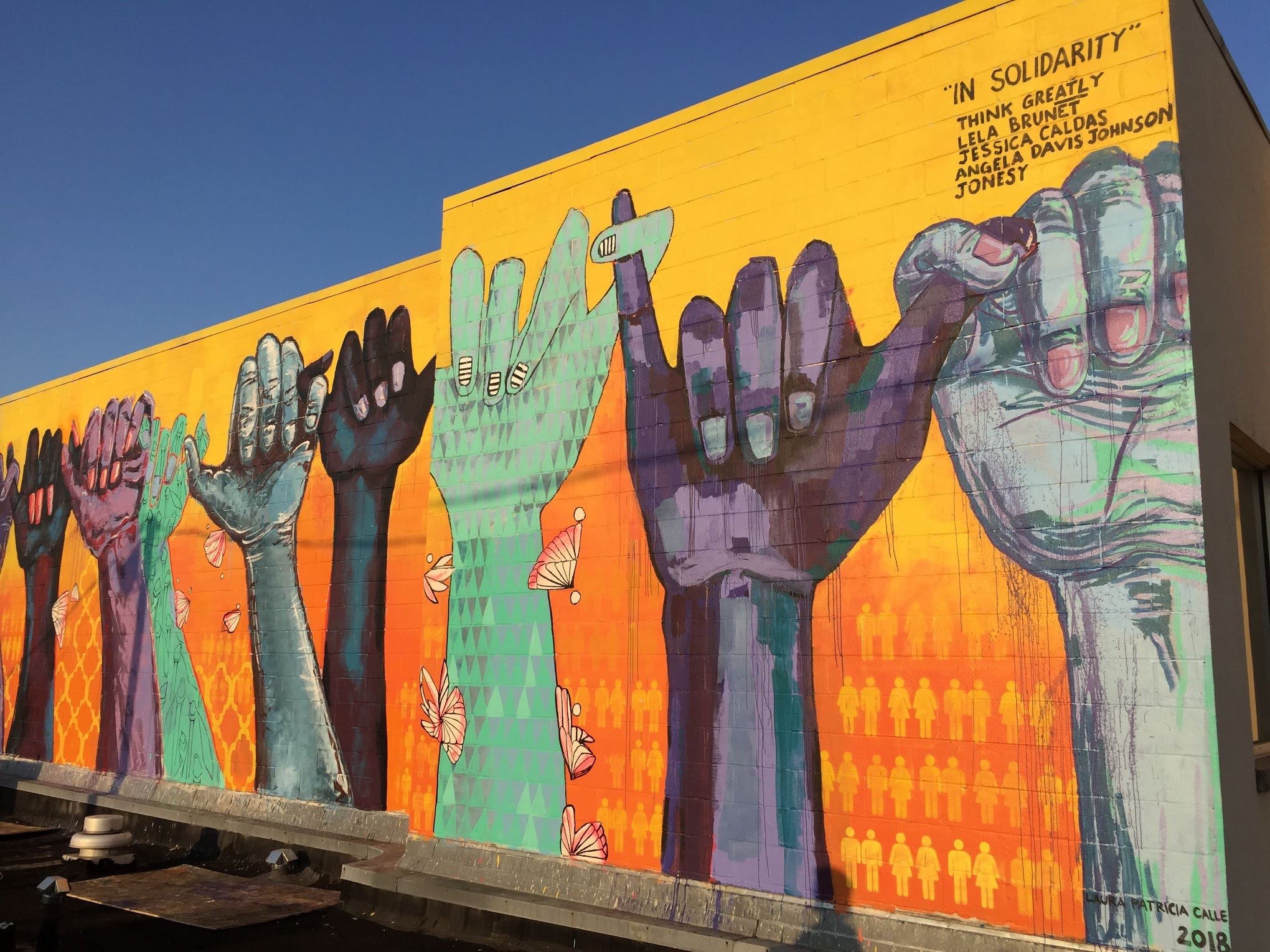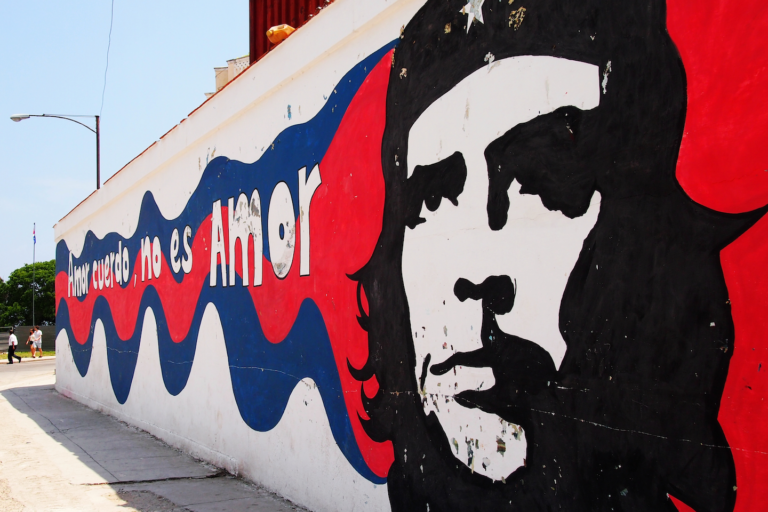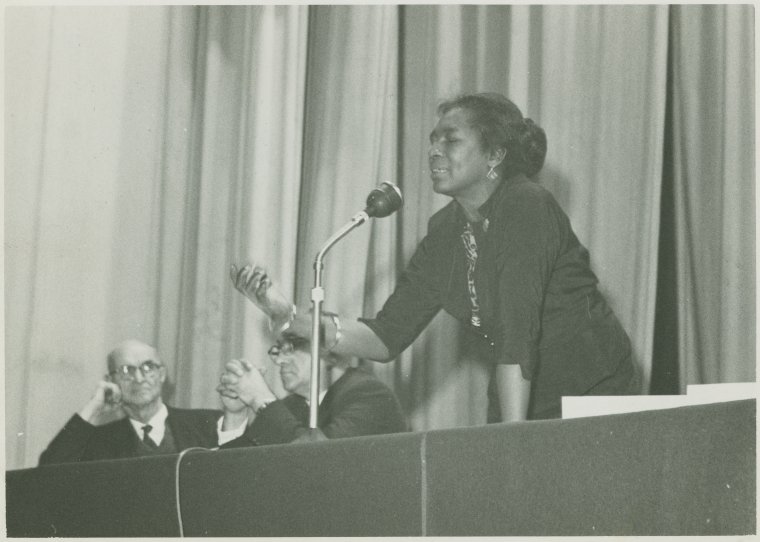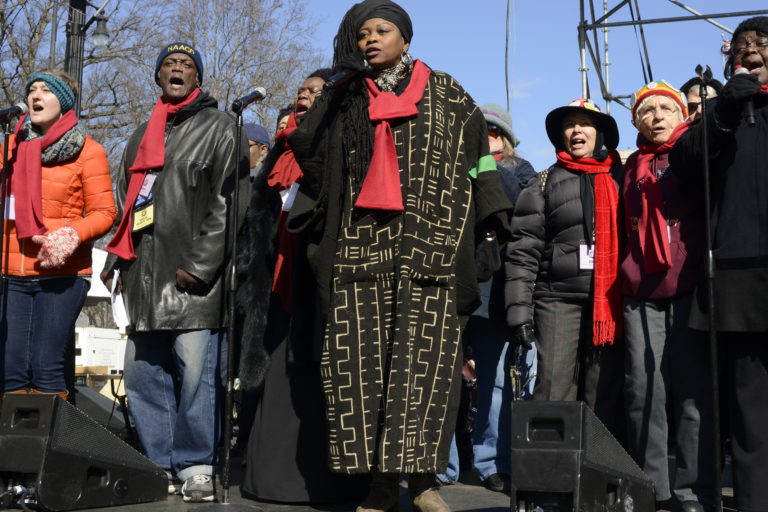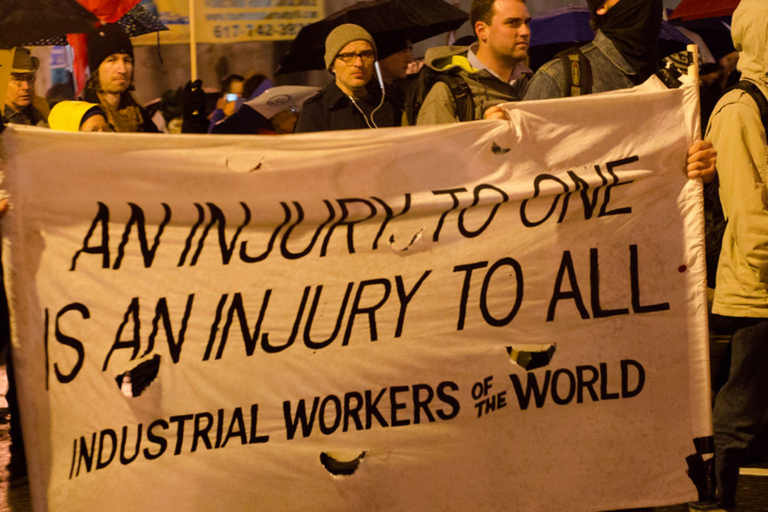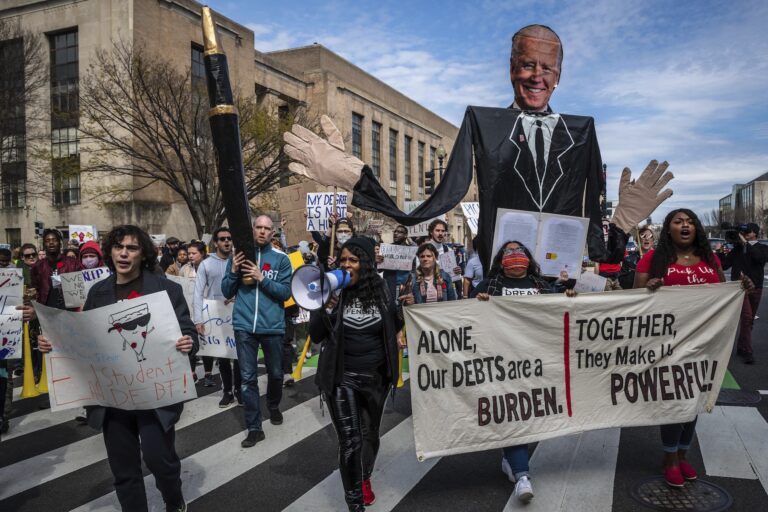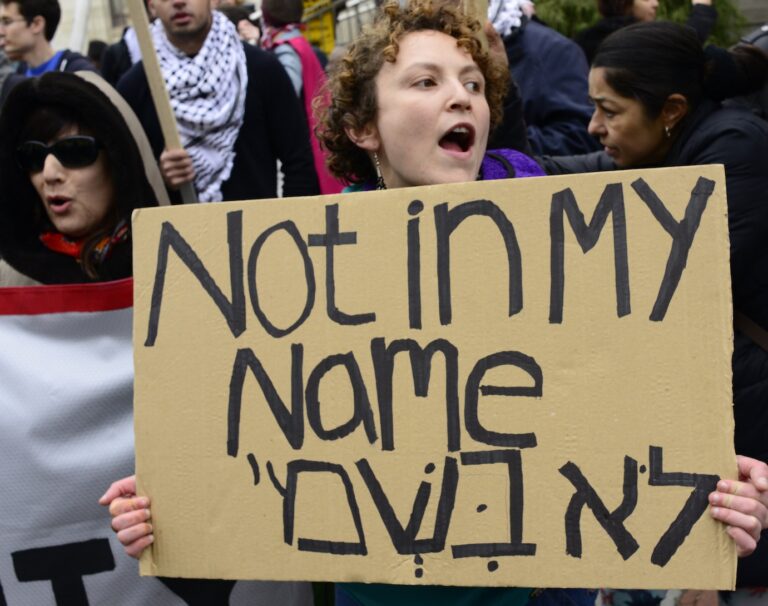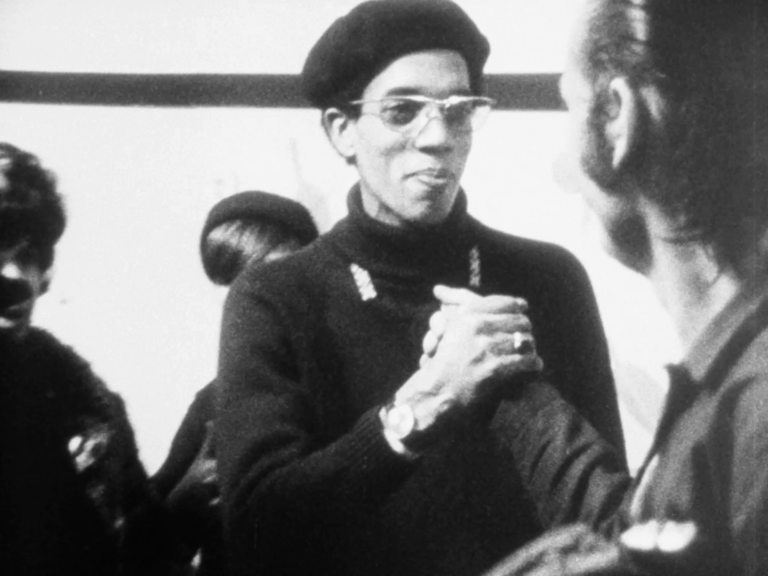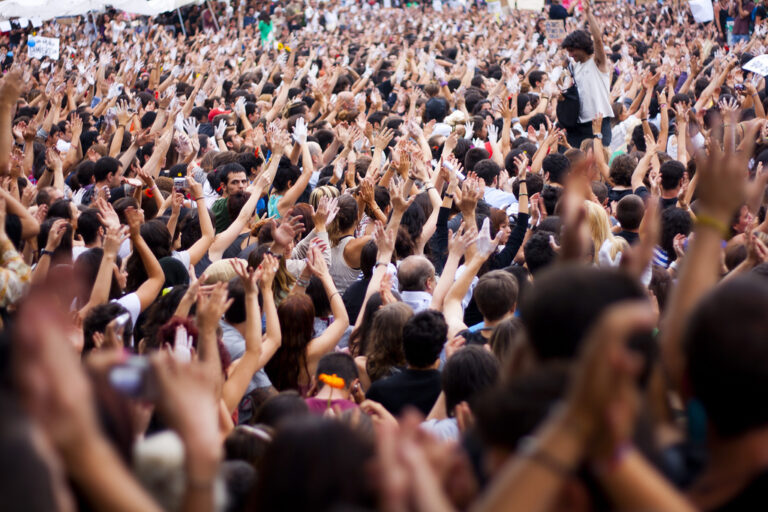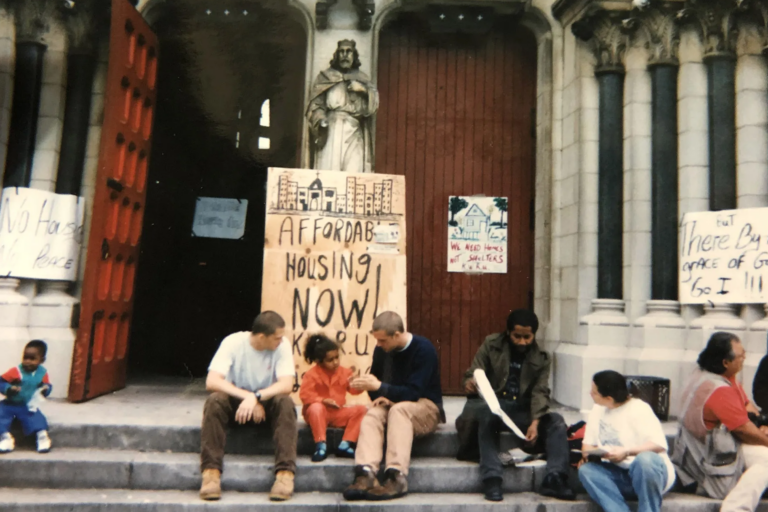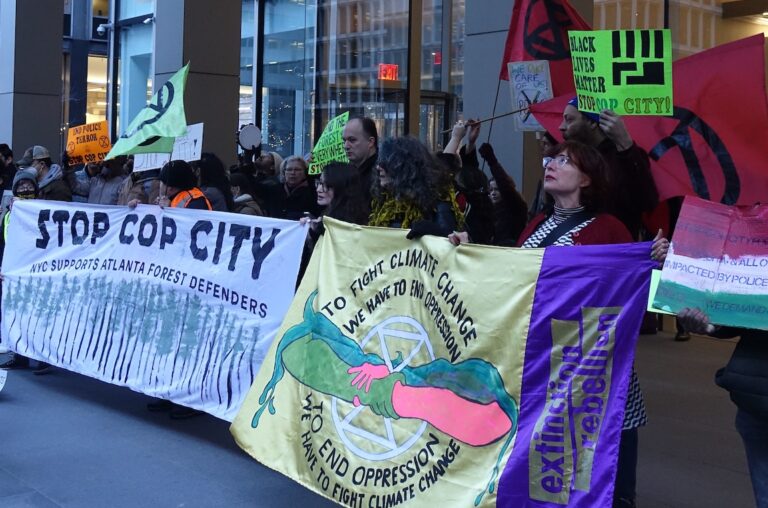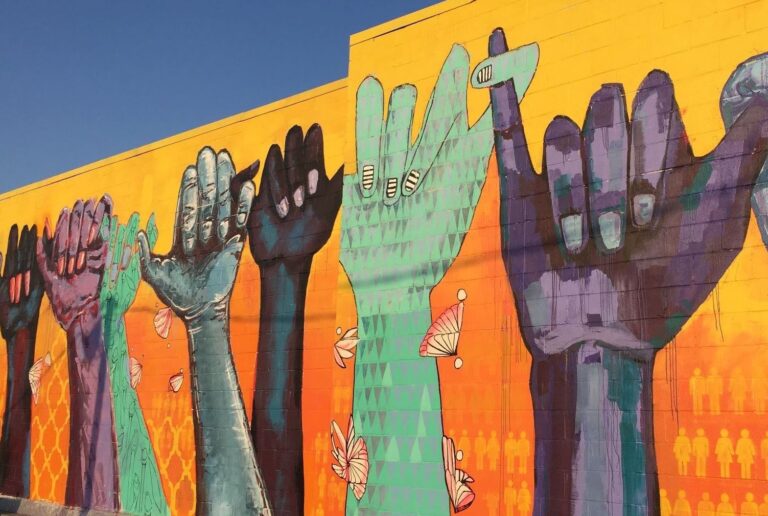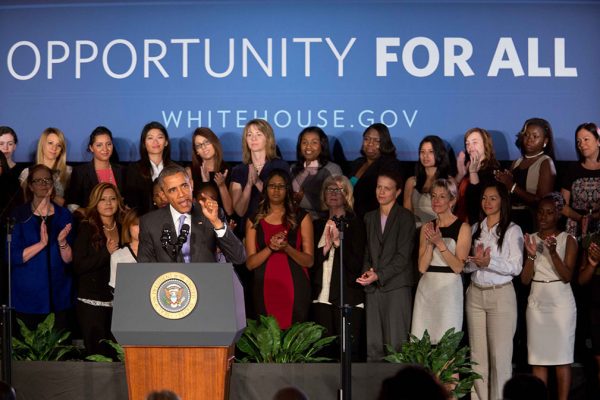This forum appears in print in On Solidarity.
At a fundraiser for a political organization this spring, a first-generation Asian American organizer from a working-class background asked me, “Why do you organize?”
The organizer—call him Henry—had requested three times that I put on a name tag, and each time I had silently refused, so we were engaged in a subtle but protracted conflict. He was being friendly, but he was also trying to organize me. I answered honestly because I was irritated. “I organize because I need to organize,” I said, “not really because I expect to change the world in any big ways. I just need to have meetings to go to. And I hope that through my actions I am generating possibilities that other people will take up in unexpected ways and that may actually bring about a revolution, even if not in my lifetime and not as a direct result of my actions.”
“That’s so interesting,” he responded. “For me, it’s because of the material changes my family needs to see to our lives in order to survive.” I felt chastened. Only a bourgeois, fourth-generation Asian American college professor organizes for the meetings.
I immediately recognized the political power of Henry’s words. Behind them lie influential left intellectual traditions that see material need as the most potent and reliable basis of solidarity. Still, something in me resisted his implicit criticism. When I consider not only my motivations for organizing but also how I learned to organize, I think of a perhaps unexpected institution: the Mormon Church. While theorists have tended to emphasize either material interest or moral commitment as the basis for solidarity, my experience growing up Mormon taught me that people organize for multiple and simultaneous reasons, sometimes opaque even to themselves. It also taught me that regularly showing up to meetings with very different people is itself a crucial basis for solidarity, at least as potent as either material need or moral commitment.
In a moment of fractious debates about the role of race and class in organizing, social endurance—the capacity to keep showing up, even when you don’t like the other people in the room—might sound like a minimalist solution, too weak to meet the challenges we face. I think it harbors a radical and ambitious lesson: that you cannot know in advance what a meeting—or a struggle over a name tag—will do to you. A commitment to cultivating endurance signals your openness to being transformed, even as you work to transform others. And it helps explain, I will argue, what we most need from a theory of solidarity today.
Political theorists and organizers have long debated the possible basis for solidarity in societies structured by dominance. If solidarity simply means collective action based on recognition of shared interests, it would seem that there can be no solidarity across lines of domination, as the interests of those who dominate diverge from the interests of those who are dominated.
This gap generates a cruel paradox, at least if we accept that such alliances—between dominant and dominated racial groups within the working class, say, or between the traditional working class and the so-called “professional-managerial class” (PMC)—are necessary to redress racial and economic domination in the United States. On the one hand, solidarity is an essential component of struggles for justice, but on the other hand, actually existing injustice renders it impossible. What do we do when winning material changes to the social world requires assembling coalitions of people who do not—and perhaps cannot—share the same motivations for organizing? What kind of solidarity is possible when our motivations for organizing diverge, or when we don’t even know what they are?
Jodi Dean says:
“What if we emphasize not social but political endurance?”
Some theorists present morality as the way to close the gap between the interests of dominant and dominated groups. In Race and the Politics of Solidarity (2009), for example, political theorist Juliet Hooker argues that, in racialized societies, solidarity is also racialized. “Solidarity requires that we care about the pain and suffering of others,” she writes. “But embodied racial difference renders the pain and suffering of nonwhites either invisible or, when visible, less deserving of empathy and redress.” Given this reality, a prerequisite to solidarity between members of dominant and dominated racial groups is a transformation of the former’s “ethical-political perspective.” On this view, white people in the United States must learn to see themselves “seeing whitely.” In other words, they must come to recognize that race regularly blinds them to the pain and suffering of nonwhites.
How can whites achieve this realization? For Hooker, the answer lies in public contestation over policies that could redress past and continuing disadvantage. Such contestation holds the potential to reshape the political community’s public memory with regard to race. But even if public debate over policing, reparations, and abolition of the prison-industrial complex could promote the kind of moral transformation Hooker envisions, can we expect fundamental changes in behavior to follow?
In a recent article, political scientist Jared Clemons argues that it is a mistake to think that even the most sincerely felt antiracism will translate into antiracist behavior under neoliberal capitalism. Clemons’s premise is that the recognition of shared class interests with Black Americans is a precondition of whites’ long-term commitment to substantive antiracist policies. Morality is not irrelevant, Clemons thinks, but moral commitment alone is insufficient. Unfortunately, he argues, neoliberal capitalism has undermined the conditions for such recognition in two crucial ways.
First, it has “privatized racial responsibility,” predisposing white people—particularly white liberal members of the PMC—to make merely symbolic antiracist commitments that do not threaten their dominant class position or social status, rather than supporting state programs that would address structural racial injustices. At the same time, Clemons argues that the white PMC is currently much more readily available to movements for racial justice than the white working class. He cites Martin Luther King, Jr.’s Poor People’s Campaign and A “Freedom Budget” for All Americans (1967), written by A. Phillip Randolph and Bayard Rustin, as examples of the kind of multiracial, working-class coalitions necessary to achieve a material transformation of society, but he is pessimistic about the possibility that such coalitions will emerge under present conditions. The gap between the interests of participants in recent movements for racial justice is just too wide.
Clemons’s careful attention to the material conditions of neoliberal capitalism and their implications for solidarity is useful. But if he is right that the white PMC is the most accessible base of white Americans for today’s movements for racial and economic justice, then a thoroughgoing materialist analysis should identify not only avenues for organizing the traditional white working class, but also ways of working with the contradictions of the PMC.
What seems crucial to this effort is not that everyone involved in today’s movements share the same motivations or even the same objective interests but that everyone have something at stake that they feel viscerally. In an interview with Stevphen Shukaitis, Fred Moten highlights the role of personal stakes in the concept of coalition embraced by the original Rainbow Coalition—the cross-racial movement forged by Fred Hampton (of the Black Panthers), William Fesperman (of the socialist, mostly white Young Patriots Organization), and José Cha Cha Jiménez (of the predominantly Puerto Rican Young Lords). As Moten puts it:
The problematic of coalition is that coalition isn’t something that emerges so that you can come help me, a maneuver that always gets traced back to your own interests. The coalition emerges out of your recognition that it’s fucked up for you, in the same way that we’ve already recognized that it’s fucked up for us. I don’t need your help. I just need you to recognize that this shit is killing you, too, however much more softly, you stupid motherfucker, you know?
For the reasons Clemons gives, we might doubt the possibility of interest convergence (“it’s fucked up for you, in the same way that . . . it’s fucked up for us”), depending on the class position of the imagined white interlocutor. But note that Moten’s emphasis is on shared “recognition,” not shared conditions of domination or oppression. In other words, the sameness he describes applies to the process of realization, not to the interests of the people involved. The promise of coalition is that we can work together across difference to change the prevailing social arrangement without fully transcending the ways that it differentiates us and even pits us against each other.
Maybe a better basis for solidarity than either morality or material interest, then—at least around racial injustice in the United States today—is ideology: a shared vision of a just society that aligns with but exceeds our material interests, that motivates us both because it would make our lives tangibly better and because we find it inspiring and attractive. This seems to be what political theorist Jodi Dean has in mind when she writes in Comrade: An Essay on Political Belonging (2019) that “comradeship binds action, and in this binding . . . it collectivizes and directs action in light of a shared vision for the future.” This kind of shared vision does not materialize out of our individual pursuits, nor does it emerge from protest alone. And, as Moten’s open expression of antipathy toward his imagined comrade suggests, forging such a vision across difference necessarily involves conflict.
In June 2020, I, like millions of other Americans, left the isolation of my apartment, where I had been watching footage of the Minneapolis protests, to join other breathing, sweating bodies in the streets. We were in the streets to protest the murders of George Floyd, Breonna Taylor, and Ahmaud Arbery, among many other Black Americans. But we were also there because we were dying of being alone and we needed to be pressed up against each other in a crowd. We were there because we were unemployed or facing the prospect of unemployment, because our jobs were killing us, because we or our loved ones were sick and dying and the state was indifferent to our plight. And we were there because we felt that these reasons were somehow connected to each other and to Floyd’s death. But forging those connections explicitly would have involved conflict, risk, and time. It was easier and safer to default to “allyship” or even a straight-up politics of deference.
I often ask my students what the summer of 2020 was like for them. For almost all of them, it was their first and only experience of a social movement. Some describe being in a crowd of people who were blocking a highway or a bridge and realizing, for the first time in their lives, that everyone around them was sincere in what they were doing. Others describe experiences of tear gas and tanks that gave them a visceral understanding of the state’s repressive power.
But another feeling my students express in the wake of 2020 is a deep skepticism about the possibility or even desirability of solidarity across difference. Even though we recently experienced one of the most remarkable displays of interracial solidarity in our country’s history, interracial solidarity—and solidarity across any form of difference, for that matter—seems less plausible now than it did before 2020. There are many enduring legacies of the George Floyd rebellions, but I think we can say that a sustained multiracial movement against policing and mass incarceration is not among them.
Could it have been otherwise? It is a common folly of left intellectuals and organizers to critique movements for not having been differently composed or executed. As Frances Fox Piven and Richard Cloward famously argue in Poor People’s Movements (1977), opportunities for protest are socially structured. Popular insurgency “flows from historically specific circumstances,” they write: “it is a reaction against those circumstances, and it is also limited by those circumstances.” It is therefore futile to critique movements for failing to conform to our theories about how protest ought to proceed. Still, the point of organizing, as I understand it, is to prepare to make the most of socially structured opportunities for protest. And in preparation for the next opportunity, the left needs to build more organizations in which differently situated people can uncover and articulate their needs and forge demands that connect them. We also need to find an approach to the problem of divergent interests that accepts the insights of standpoint theory without defaulting to deference.
The best text I have found on the process of uncovering needs through organizing is the footage of Illinois Black Panther Party section leader Bob Lee organizing white working-class people in Chicago in the 1969 documentary American Revolution 2. As Jakobi Williams details in From the Bullet to the Ballot (2015), the Illinois Black Panthers used this documentary, produced by The Film Group, to found the Rainbow Coalition and to teach their organizing model to other chapters.
The most compelling part of the documentary is a scene where Lee comes to a meeting in the Uptown neighborhood of Chicago organized by the Young Patriots. The purpose of the gathering is to organize the Patriots’ base to disrupt an upcoming meeting about the Model Cities program, a federal antipoverty initiative that the Patriots felt shut out community input. Lee works the room with incredible skill. Repeatedly, he asks the white people, who look awkward and even a little scared, “What do you want?”
When I ask my students to identify the tactics Lee uses to organize the people in the room, they note his use of physical proximity and touch. Lee is always on his feet, moving around the room and touching his interlocutors. At one point, he places his hands in the hair of a sixteen-year-old white boy named Roger who declares his desire to fight the police. In this moment, Lee’s hands express care and authority, reminding the boy of his youth and inexperience. “Before you can do that,” he says, “there’s got to be some discipline.” At another moment, Lee’s hands are on the shoulders of a middle-aged white man who sits with his arms crossed and looks uncomfortable. Later, they grasp the hands of a reticent young white woman with a toddler. Lee eventually lifts the woman to her feet and insists that she tell the room what she’s been going through. She finally speaks, and, as she describes witnessing her brother being stabbed in the back by a cop, her facial expression changes from fear to confidence and conviction.
I think my students are struck by the physicality of Lee’s approach to organizing because touching strangers in this way is completely unimaginable to them. In the same way, it is hard for them to imagine disagreeing openly with strangers or insisting that other people share their experiences of oppression. But what is solidarity if not the choice to bump up against other people, figuratively, if not literally, and allow oneself to be changed by the impact?
When I asked my students why they thought Lee insisted that the young white woman speak, a non-white student from a working-class background responded, “Because she needed to figure out why she was there.” I left class wondering what it would take for my students to be able to ask each other, “Why are you taking this class on Identity Politics? What do you want?” and for all of them, including those who were white and upper-middle-class, to know and share their answers.
Lee’s approach to multiracial organizing stands in stark contrast to deference politics, an approach to coalition building that requires relatively privileged people to accept less privileged people’s reasons for organizing as their own. Perhaps for the sorts of reasons Clemons identifies, deference politics has become the dominant approach to coalition building in our moment.
Deference politics is also the dominant practical application of standpoint theory, which originates in Marxist feminist and Black feminist thought. The basic premises of standpoint theory are as follows. First, knowledge is socially situated; it reflects the perspective of the knower, which, in turn, is shaped by their social location. Second, oppressed groups are socially located in ways that can make it easier for them to understand how society is structured, to expose existing social arrangements as contingent, and to analyze those arrangements in relation to universal human interests. And third, dominant groups are socially situated in ways that can make it easier for them to analyze the social world in relation to dominant group interests and to misrepresent existing social arrangements as necessary, natural, or universally beneficial.
As philosopher Olúfemi Táíwò argues in Elite Capture (2022), these premises are difficult to dispute. Experiences of oppression tend to predispose people to develop critiques of existing social arrangements and insights into possible alternatives. At the same time, Táíwò observes, oppression does not necessarily yield strategic insight, political wisdom, or clarity about one’s own motives and interests; the harm it produces can also be incapacitating. Moreover, people are capable of developing knowledge that transcends their own lived experience through studying, organizing, and getting to know differently situated people, and no person is fully knowable on the basis of even the most fine-grained analysis of their social location. From this perspective, the problem with deference politics is not its appeal to the premises of standpoint theory but its application of them: the tendency to treat people as fully determined, rather than only influenced, by their social location—and to assume we are fully transparent to ourselves and to others.
Still, deference politics can be attractive, in part because it can serve as a tool for evading conflict. If my perspective is irrelevant, there is no chance that you and I will have salient disagreements over our shared goals or the best means of achieving them. If I am relatively privileged, acknowledging and discrediting my perspective in advance insulates me from being accused of racism, sexism, or classism—as well as from the awkwardness of disagreeing with someone who is relatively oppressed. But coalitions formed through deference are also extremely fragile, because, as Moten suggests, the perspective of the relatively privileged person is not irrelevant. It will inevitably emerge in the process of organizing. If an organization lacks the capacity to negotiate conflicts between divergent perspectives, it will quickly dissolve. Moreover, unless people know why they are at the protest or meeting and feel the stakes of their participation viscerally, they won’t stick around through the inevitable setbacks and frustrations involved in organizing.
The past few years have given us some very useful critiques of deference politics, Táíwò’s among them. What’s lacking, I think, is a practical alternative that takes seriously the essential insight of standpoint theory—that social location influences what we can know about the social world, and, in particular, about the sources of and potential means of countering oppression. Táíwò offers “constructive politics”—collective attempts to build “power in and through institutions and networks”—as an alternative to deference politics. Where deference politics focuses our energies on redistributing power within “the room” in which we find ourselves (a boardroom, a university, a neighborhood association, a union, and so on), constructive politics aims to “build a new house.” But constructive politics does not necessarily involve attending to the ways social location influences knowledge. Think, for example, of approaches to labor organizing that are inattentive to the roles of race, gender, or sexuality in the organization of the workplace. Knowledge about intersecting forms of oppression is crucial to getting the right answers about what kinds of houses we ought to build—and to acknowledging and responsibly navigating the power dynamics within the room in the meantime.
Perhaps epistemic humility is an alternative practical application of standpoint theory. To be epistemically humble is to hold one’s beliefs about the social world open to challenge and reformulation, while retaining the ultimate responsibility for judgment. Epistemic humility requires that we acknowledge that our perspectives are limited, that we cannot fully see their contours in advance, and that we are capable of understanding beyond the limits of our own lived experience. If we are open to the possibility that we might be wrong about important things and, in many ways, ill-equipped to be good comrades because of our own past experiences, we can learn from one another’s experiences and from the experience of organizing together. In other words, solidarity becomes possible when we embrace organizing as a mechanism of political education, a way of being transformed, for everyone involved—dominated and dominator; Black, Asian, and white; working-class and PMC.
Henry’s question at the spring fundraiser helped me clarify my own reasons for organizing, which begin with my family. My Japanese family became American by way of Mormonism, which was the form of solidarity available to them in the aftermath of World War II, when my great-grandparents and their children were interned in Wyoming. Through the internment, they lost their farms, their homes, and a generation of accumulated wealth.
My grandparents met, married, and had their first child in the camp. After they were released, they relocated to a small agricultural community in central Utah. Like many Nisei who had been interned, they did their best to assimilate; they named their children after American presidents and didn’t teach them Japanese. They rarely spoke about the camp except to recall their wedding banquet. And although they were practicing Buddhists, they sent their children to the Mormon church so that they would get religious training and learn how to be Americans.
The church helped my family to survive the brutality of racial capitalism, primarily by providing us with a sense of belonging and a network that helped my father and his siblings succeed socially, academically, and professionally. My father often recalls the first church social he ever attended. Each guest received a giant sugar cookie frosted with a thick layer of pink buttercream. This cookie—a staple of Mormon food culture—seemed to my five-year-old father as big as his head. It tasted like nothing his Sansei tongue had ever encountered. The fact that he, a small Japanese boy whose family had recently arrived in Utah, had been given one of his own meant that he, too, belonged.
At the same time that it gave us a community, the church facilitated my family’s assimilation to what Daniel Martinez HoSang, in his recent book A Wider Type of Freedom (2021), calls “Caucasian democracy”—“an approach to governance that takes human hierarchy, the accumulation of profit, and the unequal distribution of life and death as core premises.” Mormons were not always on board with this form of democracy. In the nineteenth century they practiced a version of socialism called the United Order, and some prominent leaders were abolitionists (although the church was in many respects racist and, from 1852 to 1978, official church policy was anti-Black). But by the time that my family joined the church, Mormons were well into the process of assimilating into mainstream American society, including American capitalism. The church offered my family an ideology that linked private wealth accumulation and the heteronormative family to U.S. citizenship, and gave them hope in their ability to achieve not only eternal life but the American Dream.
My childhood in the Northeast was far removed from these sites of trauma and assimilation, but I felt this history when I visited Utah each summer—in my family’s intense work ethic, in my uncles’ reactionary political views, which eventually led some of them to embrace Trumpism, and in my uncles’ and aunties’ misdirected bursts of anger.
My uncle (I will call him Gerald here), the patriarch of our family, exemplified all of these tendencies—and a certain version of solidarity, too. Gerald was the only family member of my father’s generation to stay in the small rural town where they grew up. He did not return to the farm, as my grandfather had hoped someone would; instead he became a rural doctor and dedicated himself to providing affordable health care to the community, often footing the bill for patients who could not afford to pay. He raised the funds to build a new middle school in town and mentored many generations of local youth.
Uncle Gerald’s generosity was matched by his intolerance of deviations from the social norms that structured our family. When, as children, we scraped our knees while working on the farm or recreating in the mountains, we knew never to cry or complain for fear of being mocked. When, as an adult, I wrote an op-ed in the Salt Lake Tribune urging Mormons to stop paying tithing to the church until its leadership reversed a homophobic policy, I learned through a cousin that Uncle Gerald was furious that I would presume to tell him what to do.
In December 2020 Uncle Gerald died of COVID-19. On one level, his death, like every coronavirus death, was an avoidable consequence of the capitalist system that produced the pandemic and the state’s failure to manage it. At the same time, his personality and ideological orientation, including his recklessness, his libertarian leanings, and his fierce loyalty to his community, made him particularly vulnerable to the virus and to premature death. When his friend, the local dentist, got COVID-19 and requested a home visit, Uncle Gerald went—maskless—without a second thought. When he contracted the virus and developed symptoms, he chose to treat himself at home rather than go to the hospital, and the first treatment he tried was hydroxychloroquine. By the time he finally allowed my aunt to drive him to the hospital, he could barely breathe.
I often wonder what might have happened to my family if we had encountered a different form of solidarity in the wake of internment, one that was not so closely tethered to the American Dream. Would Uncle Gerald have lived a longer life? Could he have been a participant in the Black Lives Matter movement, rather than a skeptical onlooker, afraid of identifying too closely with what he called “victim mentality”? What kind of an organization might allow my family to identify racial capitalism as the root cause of our internment and my uncle’s premature death, and to find common cause with others who have an interest in transforming that system? Perhaps another answer to Henry’s question is that I organize because the same shit that killed George Floyd killed my Uncle Gerald, however more softly and however more self-inflicted, and because I, too, want my family to survive.
The vision of togetherness animating Mormonism is one of permanent unity—the formation of an “eternal family,” whose persistence depends on rigid hierarchies, the suppression of internal conflict, and the exclusion of those who might threaten the group’s stability. In this respect, Mormonism resembles what political theorist Nathan DuFord, in their recent book Solidarity in Conflict (2022), calls “antisocial solidarity”: forms of solidarity that ultimately undermine the necessary conditions for common life by cultivating domination and exclusion.
What does it look like to organize without aspiring to unity or permanence? DuFord argues that solidarity, when it is democratic, is always premised on disunity, because conflict within solidarity organizations serves as a crucial check on domination and exclusion. On this point, DuFord articulates a version of the paradox of divergent interests: “Often, solidarity organizations reproduce the exclusions and injustices from the situation in which they are formed. This is not a condemnation, but simply evidence that these organizations do not exist outside the material context in which they are formed.” Given this reality, the only way to make such organizations less exclusive is for members to agitate for change from within.
While we tend to associate neoliberalism with individualism and, therefore, with selfishness and conflict over scarce resources, DuFord shows that neoliberalism actually tends to produce a certain sort of consensus. Good neoliberal subjects assume agreement about existing economic and political arrangements and leave each other alone, rather than confronting each other and trying to change each other’s minds. In this way, neoliberal society tends to drive us apart. By contrast, DuFord suggests that conflict within solidarity organizations transforms the neoliberal subject into “a member of a society.” For DuFord, internal conflict takes “what was initially an individual goal a person perhaps thought many others shared, and transforms the goal, the person, and that person’s norms.” Through conflict, our understandings of our own interests and the world we want to build can change. At the same time, we can become more knowledgeable, less dominating, less judgmental, and more generous in our interpretations of one another—in a word, more cooperative.
Of course, even if conflict can be productively transformative, it doesn’t always have that effect. Many conflicts simply make people never want to go to another meeting again. If one product of neoliberalism is consensus, another seems to be a particular style of conflict: one that atomizes, rather than transforms, the people involved.
Recognizing this fact, DuFord attempts to distinguish between constructive and destructive conflict. Following sociologists Lewis Coser and George Simmel, DuFord identifies the former sort of conflict with “realistic” disagreements, in the sense that “something real is at stake”—strategic or “substantive” issues that are “generated in the course of advancing a constitutive aim.” As an example, we might think of ongoing conflicts within the Democratic Socialists of America over how socialists ought to engage in electoral politics. By contrast, “unrealistic conflict” is “generated for the purely psychological satisfaction of a fight”—it arises from “incompatible personalities or petty quarrels” and “lacks any true goal.” This distinction may be plausible in principle, but it is less plausible in practice. Often what seem like strategic disagreements are also personality-based conflicts. Moreover, the latter can be constructive if we accept that our personalities are shaped by our experiences of the social world and allow even these types of disputes to work on us.
A more promising way to facilitate solidarity through conflict might be to think about the norms and practices that cultivate endurance. No conflict is productive without a social context that holds people together long enough that they have to try to understand where the other person is coming from. If we don’t have to stay in the room together, we have no reason to do the difficult work of identifying the roots of our disagreement, considering the ways our experiences of privilege or oppression might be shaping our perspective, and exercising our judgment to resolve the dispute. The crucial question, then, is not how to categorize conflict as good or bad, but how to cultivate the capacity to show up when you don’t know what kind of a fight it’s going to be.
What’s missing from DuFord’s account, in other words, is the temporal dimension of solidarity. DuFord sometimes seems to suggest that stability is irrelevant to the question of how constructive conflict can be. They write, “These [internal] conflicts do threaten the groups’ stability, but solidarity organizations are not intended to be permanent political institutions.” Solidarity organizations are not meant to exist forever, and the attempt to make them do so produces perverse results. “Solidarity Forever” is a dangerous promise and a recipe for exclusion and domination. But solidarity organizations do have to endure for a while. The challenge is to figure out how to stick together long enough for conflict to effect change in the people involved, and in the world.
In this regard, Mormons have something that most neoliberal subjects lack—social endurance, or the capacity to keep showing up even when doing so is unpleasant. Growing up Mormon in the Boston area, I learned how to show up to three hours of meetings on Sundays, two hours of youth group on Wednesday night, and an hour of scripture study before school every morning that I didn’t sleep through my alarm, all with people who I mostly did not like. Over time I came to value the frustration I experienced in these meetings. Church was the one place in my life where I regularly interacted with people who were very different from me. My friends at school were all upper-middle class, Ivy League–bound, secular, and liberal. My brothers and sisters at church were from diverse socioeconomic backgrounds. Some were recent immigrants. Many were ideologically right-wing. Most believed things that I found deeply implausible. The process of learning to work with these people to do mutual aid and organize our congregation forced me out of myself in ways that I found difficult to leave.
It should be easier to leave a democratic solidarity organization than it was for me to leave Mormonism. But some degree of social endurance is essential to both personal and social transformation, given how difficult it is to hold subjects of neoliberalism together for any length of time.
To cultivate social endurance is to enter every collective in anticipation of annoyance and heartbreak. We are going to irritate and disappoint each other, despite our best intentions. Given the ways our society is segregated by race, class, and other demographic categories, we almost certainly will find things to dislike when we get together, even if only because we don’t know how to act around each other. We might even think our comrades are stupid motherfuckers, which—let’s be honest—they often are. Fortunately, as Dean argues, one of the distinctive features of comradeship is that we don’t have to like the people with whom we are in solidarity. Maybe political relationships work best when we don’t like each other, and when we express our frustrations, disagreements, and anger with the intent of moving toward a shared goal.
To cultivate social endurance is also to value conflict as a potential site of transformation. This doesn’t mean that we should actively seek conflict. But it does mean that we should not avoid necessary conflict. And when conflict arises and we find ourselves feeling chastened or annoyed, perhaps we can learn to interpret our discomfort as a process of becoming less racist, less classist, less transphobic, less judgmental, more flexible, more knowledgeable, and, ultimately, more useful to the project of building the world we want to share.
We’re interested in what you think. Submit a letter to the editors at letters@bostonreview.net. Boston Review is nonprofit, paywall-free, and reader-funded. To support work like this, please donate here.
